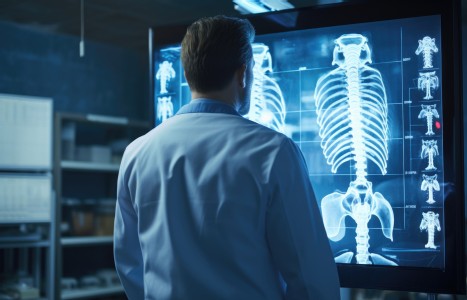Many relevant diagnostic signs are not performed deliberately by the examiner or by the patient at the examiner’s direction. They are observed as the patient reacts to their condition. Fortin’s finger sign, Minor’s sign, and Vanzetti’s sign are three examples of this principle.
We Get Letters & Email
Stroke Risk: Questions Worthy of Exploration
Dear Editor:
Michael Stefano, in his letter published in the May 2017 edition, misstates two important pieces of information with respect to the stroke leading to the death of my beloved sister, Katie May. These misstatements contribute to a misguided critique on the part of Mr. Stefano of the conclusion of the Los Angeles County Medical Examiner's report that my sister's death resulted from "neck manipulation by chiropractor."
First, Mr. Stefano erroneously implies that the "blunt force injury" noted in the Los Angeles County Medical Examiner's report was the result of a fall. Let it be known that my sister didn't fall; the "nerve" that she claimed to have "pinched" resulted from a photoshoot in bed.
Second, Mr. Stefano avers that the "aneurism" that led to my sister's stroke was in her carotid artery; indeed, much of Mr. Stefano's argument is rooted in the misconception that my sister suffered an "aneurism" to her carotid artery. Again, this is inaccurate; the cause of my sister's stroke was "bilateral vertebral artery dissection."
Moreover, Mr. Stefano's conclusion that the accident resulting in my sister's death "should and could have been reported as a blunt force trauma consistent with the history of neck injury" is baffling. That my sister engaged the services of a chiropractor to address discomfort in her neck is established. So is the fact that my sister, 34 years old and in excellent health, reported symptoms of stroke shortly after having her neck adjusted, and suffered a "infarction of the brain" (stroke) hours after leaving the chiropractor.
My family's argument has not been and is not against chiropractic, the benefits of which are well established. Rather, we seek to highlight the risk, however small, inherent in neck adjustment. There has been much discussion in the wake of my sister's death about the causative connection between neck adjustment and stroke. As noted in the autopsy report, bilateral vertebral artery dissection is a "rare complication of neck manipulation reported in one per 100,000 to one in 2 million manipulations." We should not ignore the fact that, no matter how low the odds, the "one" is a human life.
A far greater risk lies in the exacerbation of pre-existing injuries to the vertebral artery in the course of neck adjustment. To this end, several questions arise: What precautions are taken by chiropractors to ensure that the artery has not been in any way compromised prior to adjustment of the neck? Are these precautions standard? If not, why not? If so, how can they be made more rigorous?
Given the devastating consequences of vertebral artery dissection, these questions are not only worthy of exploration but in my family's view, essential.
Stephen May
Brother of Katie May
Science vs. So-Called Science
Dear Editor:
This letter is in response to the recent June letter entitled, "The Irony Is Thick." If Dr. Aamodt had actually watched the "Vaxxed" movie, he would have seen that the movie is fully and completely documented – especially by a CDC "whistleblower" named William Thompson, who admitted the CDC data was fraudulently obtained in order to avoid vaccines (MMR) from being implicated in causing autism. In other words, the so-called "science" he is referring to is really faulty science.
I know several chiropractic and Amish kids who never were vaccinated and are perfectly healthy without any unnecessary vaccines. Prior to 1970, Autism was one in 10,000 in the U.S, and now after 47 years of an intense vaccine schedule, it's about one in 50. And you can't blame this on genetics, because genetics hasn't changed in 10,000 years.
Polio was on its way out mostly before the Salk and Sabin vaccines. This is fully documented. The Bubonic Plague was eradicated in Europe without any vaccines for it at all.
We know that in science, the exception ends the rule; meaning there are thousands and thousands of chiropractic and Amish kids who were never vaccinated, who are perfectly healthy without the epidemic diseases we see in America today – autism, ADD. ADHD, auto-immune diseases, allergies and asthma. I believe a lot of this is from the shots.
My understanding is that vaccines are a big money maker for the drug companies, and the CDC holds several patents for the manufacturing of several vaccines. Do you think, Dr. Aamodt, that the CDC would investigate the safety of vaccines properly when it has such a vested financial stake in it?
Yes, we believe in science, and yes we believe in antibiotics to treat serious infections like pneumonia. However, you better recommend a probiotic with that in order to protect your microbiome. Now that's science!
Eugene Goldberg, DC
Pittsburgh, Pa.
A Better Option Than Prescribing
Dear Editor:
I come from two generations of DCs and have around 10 or more in my family. I have practiced by myself and had patients crawl into the office and get on my adjusting table, only to get stuck there with incapacitating pain and have to have EMTs come in and take them away by ambulance to the local ER. I have also practiced in a multidisciplinary setting, whereby the acute low back patient who couldn't move to get off the table was handled right then and there with medication that helped them get through without the time and expense of an ambulance ride to the ER.
So, would it be helpful (both economically and in term of time management) to the patient if every DC who wanted to be able to intervene in that way could? From the economic and time management point of view, yes. Is that a departure from the drugless heritage we started with as a profession? Yes. Would it reward us financially? Yes, although if not careful, it could cost more if malpractice rates went up substantially.
Would it reward us with elevated status? Maybe. Most patients know we don't give drugs and come to us anyway, and those who don't know that we don't give drugs stay with me in my practice, so I don't think our public status will change. However, the status elevation DCs really want is with insurance carriers so we get paid more and equally. In fact, I would postulate that the whole push for prescribing rights is really not even status based as much as it is about money.
If every DC were seeing as many patients as they could and making money equally with MDs, would anyone want the extra responsibility that comes with prescribing medication? I venture to say not a single DC would want to do it.
I have an answer for the profession; one which gains you an elevated status with not only individuals, but also Corporate America. I'm talking about occupational health care and corporate wellness, where you are paid to keep employees healthy and safe by doing physicals, drug and alcohol testing, hearing testing, etc., and by being asked to be the company doctor for all their work injuries. (I am now the company doctor for two 900-person companies, as well as several other smaller companies of 100-300 employees.)
There is much work to be obtained for DCs (without adding drugs) by going into occupational health care, where DCs can help save Corporate America from financial ruin due to the high cost of medical care. If we become the PCPs of the corporate world handling injuries and wellness, and leaving infectious control to the MDs, would the world not be a better place for both the employees and us DCs?
James Raker, DC, FADP
Texarkana, Ark.


